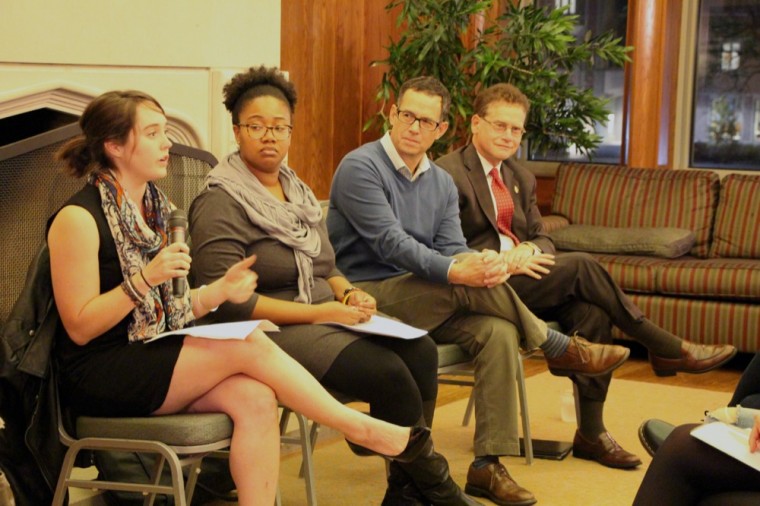News
Washington University report reveals startling health discrepancies, prompts panel
Washington University researchers recently found that life expectancy in northern downtown St. Louis city is 67 years, while on campus and in Clayton, it is 85 years, highlighting health discrepancies within the St. Louis region.
Public health researcher Jason Purnell and colleagues at the Institute for Public Health and St. Louis University assessed the 63106 and 63105 ZIP codes over 14 months to explore racial health disparities.
 Michelle Zhang | Student Life
Michelle Zhang | Student Life Panelists speak about health disparities in St. Louis, particularly in reference to a recent study that described an 18-year difference in life expectancy between nearby St. Louis zip codes. The event was sponsored by Frontiers Magazine: Wash. U. Review of Health.
Frontiers Magazine, the University’s health review publication, hosted a panel on Wednesday night to raise awareness about these disparities.
Junior Carly Herbert, executive director of Frontiers Magazine, said the panel was a way for the magazine to bring together reporting and health in a public format.
Panelists included Jorge Riopedre, executive director of Casa de Salud, a local clinic for immigrants; Durrie Bouscaren, health and science reporter at St. Louis Public Radio, Matthew Kreuter, associate dean of public health at the Brown School of Social Work; and Jennifer Drake Fantroy, a policy strategist and student at the Brown School.
The discussion began with opening statements during which the panelists echoed sentiments regarding the complexities underlying the public health disparities seen in the aforementioned report.
Kreuter said one difficulty in addressing disparities was differing priorities between public health officials and people affected by health disparities.
“We are focused on improving the health of populations but the populations that we’re trying to help are worried about different things,” Kreuter said. “They’re worried about feeding their family. They’re worried about paying the rent. They’re worried about are they going to have to take on another job. They’re worried about safety. When you have unmet basic needs, like those, how important is it that you go out and get a mammogram? How important is it that you eat a healthier diet?”
Junior Lucy Chin appreciated the panel’s focus on current and local health issues and their appreciation for the complexity of public health disparities.
“As a student interested in studying public health and social work, I took away many questions about where and how to situate myself in solving issues that affect our city and, more broadly, our country,” Chin said.
She also praised the panel for showcasing the various demographics that health disparities affect.
After the panel, the floor was opened for questions. Topics ranged from panelists’ personal experiences with public health discrepancies to the importance of professional collaboration to and the benefits of the human element of public health.
Riopedre said that connecting with the people in underserved areas was vital to improving their healthcare.
“Because they feel cared about. Because they feel that we actually give a d— about them, not just, ‘OK, here’s your pill and move on.’ That relationship, I’m convinced, is what is producing the incredible medicinal results that we’re getting,” Riopedre said.
